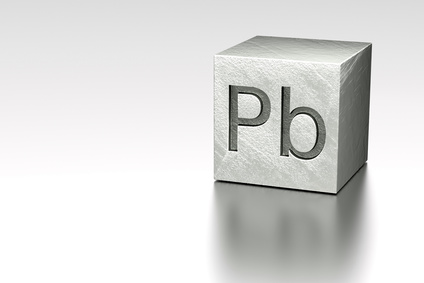Do you have lead toxicity? Get yourself tested here.
Lead is a common well-known toxic heavy metal that can make you very sick as it accumulates in your body over many years, this is called lead toxicity or slow lead poisoning. Lead is a serious threat to people’s health, it’s colorless, tasteless and odorless so it can go virtually undetected and or un-diagnosed. Excessive amounts of lead place adults at a higher risk for cancer, stroke, and hypertension. In children, lead is known to cause brain damage, reduced birth weight, seizures, behavioral disorders including ADD, ADHD, and a lower IQ.
Consequently, lead is considered one of the most serious environmental health hazard for children.
Many people believe that lead toxicity is an old problem that was found in old paint and leaded fuels and since the removal of lead from these sources, people think that lead levels are safe, the truth is lead and the toxicity of lead is alive and well found in many people world-wide.
Lead today is found in our polluted environment, it ends up in our water and food supply, it is still used in manufacturing, plumbing, car parts, batteries, pesticides, cosmetics and industrial waste just to mention a few. The real question is are you toxic with lead?
Symptoms of Lead Poisoning
Symptoms associated with lead poisoning vary depending on the amount you are currently exposed to and your age, some of the symptoms would include:
- Cancer
- Stroke
- Hypertension
- Brain damage & lower IQ (In children)
- Behavioral problems (Children, ADD, ADHD)
- Leg pain (Children, cramping of the leg or spasms of the blood vessels)
- Teenage & adult crime
- Reduced birth weight
- Seizures
- Colon cancer
- Digestive problems
- Autism
Additional Symptoms of Lead Toxicity
Lead toxicity also becomes a bigger problem when it replaces essential nutrients such as calcium, zinc or iron. When these nutrients become depleted, lead takes their place and plays havoc with your health. Deficiency symptoms of these essential nutrients are therefore indicators of possible lead toxicity. If a person has deficiencies in all three of the essential nutrients toxic levels of lead can become far more toxic.
It’s important to understand that vitamin & mineral supplementation can NOT resolve lead toxicity and may cover up symptoms leading to bigger problems. Detoxification of lead is essential to properly restoring vitamin and mineral imbalances.
Calcium deficiency – Muscle cramps or tremors, insomnia or nervousness, joint pain or arthritis, tooth decay, high blood pressure can all be indications of lead toxicity.
Zinc deficiency – Poor sense of taste or smell, white marks on more fingernails, frequent infections (low immunity), stretch marks, acne or greasy skin, low fertility, pale skin, tendency to depression and or loss of appetite can all be indications of lead toxicity. Also see Pfeiffer disorder for mental health and behavioral problems.
Iron deficiency – Anaemia, pale skin, sore tongue, fatigue, listlessness, loss of appetite, nausea, sensitivity to cold can all be indications of lead toxicity.
Lead in your mouth
Lead is often found in metal dental amalgams, these tooth fillings can leach lead and mercury into your body and cause heavy metal toxicity.
Lead on the brain & bad behavior
Lead, once it enters the body can go straight to your brain and interfere with your normal mental functions altering your neurotransmitters. There is a clear link in research studies that lead affects behavior and lowers IQ. Studies conducted found that the higher the lead levels found in children, the worse their behavior and learning ability also reduced vs those children that had lower levels or no lead toxicity.
It’s clear that lead has a toxic influence over how the brain functions and the essential mineral zinc. Zinc has many roles in the body because it acts as a catalyst producing hundreds of chemicals needed by the brain to function. There is a clear link between behavioral and learning disorders such as ADD (attention deficit disorder), ADHD (Attention deficit hyperactivity disorder), schizophrenia, Autism and other mental disorders, the influence of lead toxicity and the relationship to Pfeiffer disorder.
The pfeiffer test can reveal if there is disruption in the combination of core nutritional elements associated to zinc related disorders that could be the result of lead toxicity.
Lead Toxicity & Genetics
Some people are genetically predisposed to lead toxicity, this is because certain genes belonging to liver detoxification pathways that normally deal with lead detoxification have been deleted, in these cases a genetics test can confirm and a specialized nutritional program can help the individual detoxify cadmium.
Do you have lead toxicity?
The best way to find out if you have toxic levels of lead and or if you’re at risk from lead related disease is by a hair mineral analysis, this simple home test shows if you are toxic and guidance can be given to how to detoxify the lead in your situation as everyone is different.
Detoxification of lead
Often people attempt to detoxify lead without knowing if they have toxicity and without knowing the best ways to achieve results. Many heavy metal detoxification supplements on the market do not work and often contain toxic heavy metals themselves.
Lead is a very toxic metal and each person who has been exposed to the metal is affected in different ways, this can cause detoxification problems.
It’s important to have yourself tested by professionals that can guide you through the detoxification process that will work for you personally. It’s also possible that you may have a gene mutations which can make any basic detoxification program useless and or harmful.
Have any questions about lead toxicity & treatments? Click here to get an online consultation now.

